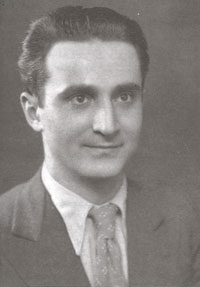SIDQI, NAJATI (1905-1979)
Born in Jerusalem on 15 May 1905 to a father of Turkish origin and a Palestinian mother from Jerusalem; was educated in local schools, incl. Al-Salahiya, Ar-Rashidiya, Al-Ma’mouniya and the Sultan Office; accompanied his father to Hijaz and then Syria, Egypt, and back to Jerusalem; worked in the postal service of the British authorities until 1924; was exposed to Communist thinking and ideas brought by Russian Jewish thinkers and joined the Communist Movement in Palestine (until 1939); went to study Political Economy in Moscow in 1925 and became good friends with Turkish poet Nazim Hikmat, who gave him the political nickname ‘Mustafa Sa’do’; returned to Palestine in 1929 and got involved in the process of Arabizing the Communist Party in Palestine; was imprisoned by British forces for his political work in 1931 and forced into house arrest in Jerusalem; fled to Haifa, then Lebanon (in 1933) and France, where he published Ash-Sharq ‘Al-Arabi newspaper until it was shut down in summer 1936; moved to Moscow; was sent by the Communist Party to Spain during the 1936 civil war to convince Franco’s Moroccan troops not to fight with the fascist regime; after that was sent to Algeria, Paris, Damascus, and Beirut, where he held many important ranks in the Communist Party; left the party in 1939 after the party welcomed the Aug. 1939 Non-Aggression Pact between Hitler and Stalin, while he opposed Nazism and Fascism and disagreed with party members in Lebanon; moved back to Jerusalem and worked as writer, translator, radio broadcaster; among the international literature he translated into Arabic was Edgar Allan Poe’s The Black Cat; died in 1979; in 2001, the IPS published the Memoirs of Najati Sidqi (by Hanna Abu Hanna).

صدقي، نجاتي (1905-1979) من مواليد القدس عام 1905 لأب من أصل تركي وأم فلسطينية من القدس ؛ تلقى تعليمه في المدارس المحلية، بما فيها الصالحية، الرشيدية المأمونية ومكتب سلطان؛ رافق والده إلى الحجاز، ثم إلى سوريا، مصر، وعودة إلى القدس؛ عمل في مكتب الخدمات البريدية التابع للسلطات البريطانية حتى عام 1924؛ تعرض للفكر والأفكار الشيوعية التي جلبها المفكرين الروس اليهود وانضم إلى الحركة الشيوعية في فلسطين (حتى عام 1939)؛ ذهب لدراسة الاقتصاد السياسي في موسكو عام 1925 وأصبح صديقاً مع الشاعر التركي ناظم حكمت الذي منحه الاسم السياسي “مصطفى سعدو”؛ عاد إلى فلسطين عام 1929 وانخرط في عملية تعريب الحزب الشيوعي في فلسطين؛ سجنته القوات البريطانية لعمله السياسي عام 1931 ووضعته تحت الإقامة الجبرية في القدس؛ فرّ إلى حيفا، ثم إلى لبنان (عام 1933) وفرنسا حيث نشر جريدة الشرق العربي حتى أغلقت في صيف عام 1936؛ انتقل إلى موسكو؛ أرسله الحزب الشيوعي إلى اسبانيا خلال الحرب الأهلية عام 1936 لإقناع القوات المغربية بعدم القتال مع النظام الفاشي؛ بعد ذلك تم إرساله إلى الجزائر، باريس، دمشق وبيروت حيث تقلد العديد من المراتب الهامة في الحزب الشيوعي؛ ترك الحزب في عام 1939 بعد ترحيب الحزب بمعاهدة عدم الاعتداء التي وقعت في آب/ أغسطس عام 1939 بين هتلر وستالين فيما عارض نظيم والفاشية واختلف مع أعضاء الحزب في لبنان ؛ عاد إلى القدس وعمل ككاتب، وكمترجم وكمذيع راديو؛ من بين الأدب العالمي الذي ترجمه إلى اللغة العربية القطة السوداء لأدغر ألان؛ توفي عام 1979؛ وفي عام 2001، نشرت مؤسسة الدراسات الفلسطينية مذكرات نجاتي صدقي (بقلم حنا أبو حنا).
